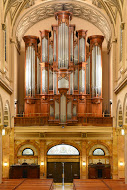Durufle Requiem and Other Works
 When: Thu., Nov. 2, 2017 at 8:00 pm - 10:00 pm
When: Thu., Nov. 2, 2017 at 8:00 pm - 10:00 pm All-Duruflé Evening Casts N.P. Mander Pipe Organ as Central Character on November 2
All-Duruflé Evening Casts N.P. Mander Pipe Organ as Central Character on November 2
Celebrating its 25th anniversary this year, the magnificent pipe organ at the Church of St. Ignatius Loyola (980 Park Avenue at 84th Street) takes a central role for Maurice Duruflé’s beloved Requiem and other works, November 2 at 8 pm, performed by the Choir of St. Ignatius Loyola, organist David Enlow, mezzo-soprano Sara Murphy, baritone Steven Eddy, and cellist Sarah Hewitt-Roth, under the direction of K. Scott Warren. Tickets are $25-$80; purchase at smssconcerts.org or call 212-288-2520.
For 25 years, the mighty N.P. Mander organ has been a defining feature of the Church of St. Ignatius Loyola; at 30 tons and 45 feet high, its 5,000 pipes, 55,000 parts, four keyboards, and 68 different stops fill the stunning sanctuary with lush, crisp, nuanced, and powerful music that has become a hallmark for parishioners and patrons of Sacred Music in a Sacred Space (SMSS) concerts.
Among the many offerings of this SMSS season, the 2017-18 Choral Classics cast the magnificent pipe organ as a central character, along with the resident Choir and Orchestra of St. Ignatius Loyola. Maurice Duruflé’s beloved Requiem (Op. 9) with organist David Enlow is the first Choral Classics offering on November 2, on a program that includes lesser-known gems by Duruflé as well: his Mass Cum jubilo (Op. 11), Four Motets on Gregorian Themes (Op. 10), and Notre Père (Op. 14).
Scott Warren, Artistic Director of SMSS and Director of Music Ministries at the Church of St. Ignatius Loyola, who conducts the concert on November 2, reflects, “Over the last 25 years, the N.P. Mander organ has been woven into the fabric of our parish and New York’s musical community. It is fitting that we dedicate the 2017-18 season to celebrate what has become a landmark instrument, noted the world over for its beauty, sonority, and craftsmanship.”
Himself an extremely accomplished pianist and organist, Maurice Duruflé (1902-1986) is a favorite composer of organists, who cherish his additions to their repertoire. Wider musical audiences know his music largely through the Requiem, composed in 1947. His Mass Cum jubilo has become more familiar to audiences in the three decades since his death.
Duruflé’s musical training included study at the choir school of the Rouen Cathedral, a magnificent environment, which first introduced the composer to the solemn weaving melodies of Gregorian chant, as he described in his memoirs (Mes souvenirs, 1976): “The extraordinary environment of this cathedral, the presence at all the services of some fifty major seminarians singing the plainsong and alternating with the motets of the maîtrise … the accompaniment of the orgue de choeur, this splendor that was evoked as the liturgy unfolded, profoundly impressed me.”
Gregorian themes permeate the Requiem, but the overall effect is not one of solemnity or calmness. Rather, the composer tells us, in notes prepared for a performance of the work in 1980, “This Requiem is not some ethereal work that sings of the escape from earthly cares. In the immutable style of Christian prayer, it reflects the anguish that man experiences when faced with the mystery of his ultimate end. It is often dramatic or filled with resignation—or of hope, or of horror, much like the words of scripture that are used in the liturgy. It tries to translate human feelings as they face their terrifying, inexplicable, or consoling destiny.”
Tickets $25-$85
Buy tickets/get more info now